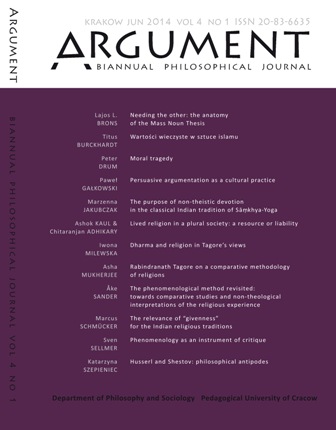Rabindranath Tagore on a comparative study of religions
Rabindranath Tagore on a comparative study of religions
Author(s): Asha MukherjeeSubject(s): Comparative Studies of Religion, Indian Philosophy
Published by: Wydawnictwo Uniwersytetu Komisji Edukacji Narodowej w Krakowie
Keywords: Rabindranath Tagore; The Religion of Man; religious studies; religious pluralism; philosophy of religion; comparative studies; Hinduism; universal religion; divinity of Man
Summary/Abstract: The study of religion describes, analyses and compares how certain human beings do in fact express their faith in terms of particular scriptures, religious figures, sacred rituals, community solidarity, etc. It also demonstrates how all these explicitly religious phenomena may relate to other aspects of people’s lives. It also aspires to address the questions in a manner that is evenhanded, objective and based on evidence that may be checked by any competent inquirer, and non-committal on claims to divine revelation and authority. It is in principle comparative, not in a judgmental evaluative sense, but in terms of describing and analysing comparable elements and or phenomena from various religious traditions, using the same criteria in each case. The paper begins with a brief report on the study of religion in the context of India and presents in detail Rabindranath Tagore’s (1861–1941) views on the need, an objective and philosophy behind the comparative study of religion. As Tagore observes, when studying religion one usually chooses between two alternative approaches: to do research on the secret text or to study the rituals. Tagore accepts none of them fully. Instead, Tagore suggests rediscovering how human aspiration for transcendence works in practice, how it sustains the individual — often marginalised by the power of institutionalised religion — and society, and how it generates new cultural forms. For Tagore, the essence of religion lies in the will to transcend the limit of the self-cantered being towards an ideal of perfection — which he calls divinity of Man. His understanding of the “religion of Man”, as he puts it, is discussed in the major part of the paper.
Journal: ARGUMENT: Biannual Philosophical Journal
- Issue Year: IV/2014
- Issue No: 1
- Page Range: 69-80
- Page Count: 11
- Language: English

